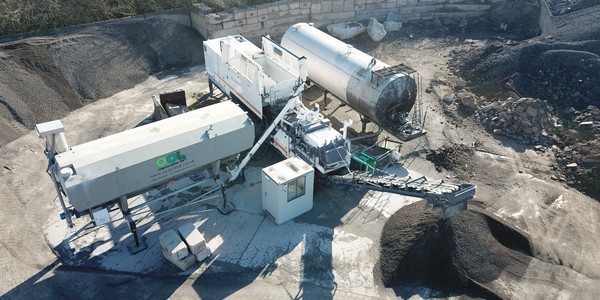Recycling waste for road repairs saves cash and carbon
Hundreds of tonnes of material that was previously treated as waste and which needed to be safely and expensively disposed of is being used to help repair Oxfordshire’s roads.
Oxfordshire County Council is working with its contractor Milestone and its partner OCL Regeneration to make use of the toxic tar-bound material that is removed during road and path resurfacing work.
The recycled material will be used in road maintenance projects at 11 different sites in Oxfordshire between 11 October - 3 November. The process is an example of the ‘circular economy’ – where waste products are utilised, rather than disposed of – and will save money, reduce carbon emissions, and minimises the need for new materials.
Councillor Tim Bearder, Oxfordshire County Council’s Cabinet Member for Highways Management, said: “We know how important the condition of our roads is to the people of Oxfordshire, so to be able to carry out this sort of repair work in a more environmentally friendly way is fantastic. And the fact that we are saving council taxpayers’ money while we are doing it makes it a win-win situation.”
The recycled material is being processed at the council’s depot in Drayton, near Abingdon, following a successful trial period last year. The schemes will involve:
- Treating a total area of 24,160 square metres, which is just over the size of three football pitches.
- Using 765 tonnes of this recycled material, the equivalent weight of around 60 double decker buses.
- Saving 16.8 tonnes on carbon dioxide from being emitted – the equivalent of 3,000 return trips from London to Sydney using direct flights.
- An overall cost saving for this work of around £20,000.
Councillor Pete Sudbury, Oxfordshire County Council’s Cabinet Member for Climate Change Delivery and Environment, said: “Waste is now being recognised as a potential feedstock for the recycling process, rather than something which needs to be disposed of. The circular economy means that instead of following the carbon-intensive linear pattern, where new materials are sourced for projects, we are giving more thought to the use of recycled materials and planning up to a year in advance so that this can be achieved in suitable areas.
“We in Oxfordshire currently consume resources at three times the rate the Earth can regenerate them, so there is a lot to do, and we, at the county council, will be driving forward other schemes across all of our activities.”
All the projects are road surface inlay schemes and will take place at 11 locations in Faringdon, Wantage, Wheatley, Kidlington, Banbury, Bodicote, Little Rollright and Witney.
Tackling climate change and reducing carbon emissions are key aims of Oxfordshire County Council. Last year, it approved its Climate Action Framework, which set out plans to make itself a carbon neutral authority by 2030, and to enable Oxfordshire as a whole to become zero-carbon by 2050.
Click Sign up to hear from us and receive the latest news and updates thanks to our fortnightly newsletter, Your Oxfordshire.

